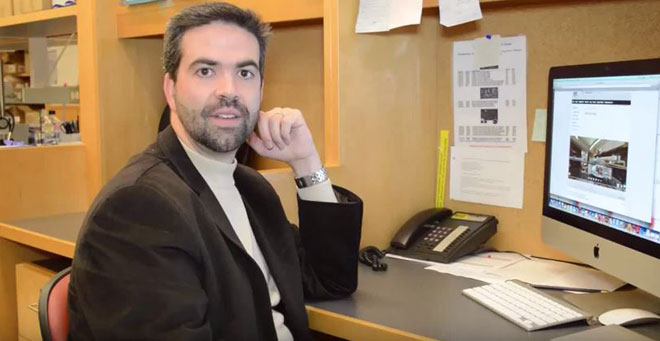|
|
|
|
John Harris, MD, PhD, at the Vitiligo Clinic and Research Center. |
At the UMass Medical School Vitiligo Clinic and Research Center, John Harris, MD, PhD, combines clinical practice and lab research, offering patients treatment and scientists a place to work toward a cure, according to an article in the Worcester Telegram & Gazette.
“We have learned a lot about what causes vitiligo,” Dr. Harris, assistant professor of medicine, said in the interview. “Genes play an important role, but they are not everything.” Other factors such as environment may also be in play, and some think that stress plays a role.
Vitiligo is an autoimmune disease that results in the appearance of white spots on the skin. The disease afflicts more than 70 million people worldwide, yet there remains relatively little research and investment made into discovering its cause and identifying primary sources for treatment of the autoimmune disorder.
At UMMS, Harris has dedicated his research to better understanding what causes vitiligo, in order to develop new treatments.
“Vitiligo is an under-recognized disease in the U.S. and globally, with potentially devastating consequences for patients. Current treatments are not FDA-approved, and are only moderately effective. We now have an opportunity to change this for them,” he said.
Vitiligo affects people regardless of race or gender. The Harris Lab has identified a key inflammatory pathway that causes vitiligo, and researchers there have begun to test new treatments that shut this pathway off, stopping the spread and reversing the disease through repigmentation of the white spots. In fact, one of his recent studies reported that a drug targeting the pathway effectively reversed vitiligo in one of his patients.
Harris is part of several international vitiligo advocacy and research groups including the Vitiligo Working Group and Step Up 4 Vitiligo. The groups include clinicians, scientists and advocates with the goal of increasing public awareness and support for clinical treatments, research funding, standardizing clinical trial protocols and establishing a registry for a biobank of tissue samples on which labs can work, for example.
World Vitiligo Day is Saturday, June 25.
“Understanding the cause of vitiligo and developing new treatments is only solving part of the problem. We also need to create awareness of the disease and its consequences, and advocate for our patients to get the care they desperately desire and deserve,” Harris said.
